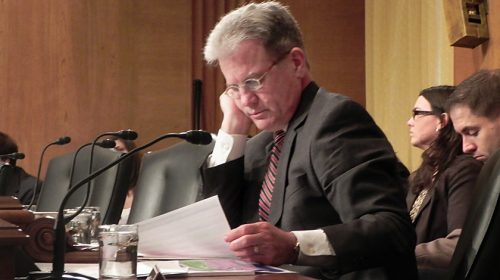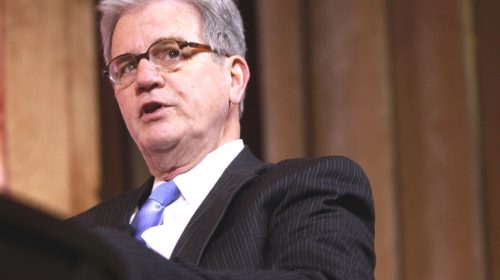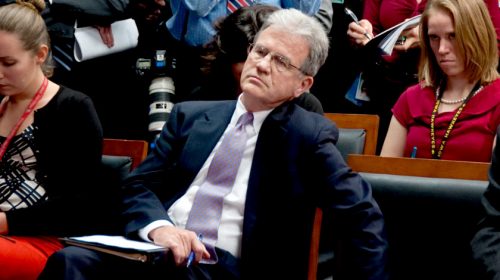by Romina Boccia
Former Sen. Tom Coburn was a hero among fiscal conservatives and endless source of inspiration and courage. The Oklahoma Republican embodied financial stewardship, always showing great respect for the hard-earned tax dollars of working Americans.
Coburn, who died late Friday at 72, helped the American people better understand the size and scope of Washington’s spending problem by highlighting government waste.

His office helped to uncover a vast Social Security Disability Insurance fraud scheme with a plot line ripe for a movie or TV crime show.
He later proposed the first comprehensive reform of Social Security Disability Insurance to improve the disability determination process, reduce fraud, and ensure benefits are there for individuals with disabilities for whom the program was intended.
Coburn, a family doctor and obstetrician in Muskogee, Oklahoma, also led the way on reforms to entitlement programs and toward a better budget process that demanded accountability and fiscal restraint from lawmakers.
He earned the nickname “Dr. No” for confronting members of both parties in blocking fiscally irresponsible legislation.
Washington would be a much better place if it had more selfless and dedicated leaders like Tom Coburn.
He represented northeastern Oklahoma in the House from 1995 to 2001 before returning to his practice and then serving in the Senate from 2005 through 2014. He stepped down before the end of his second term after a recurrence of prostate cancer.
Coburn was popularly known for highlighting egregious government waste in Washington, including the notorious example of tiny shrimps on a treadmill and the perfect combo of scary and cute: Robo-Squirrel. His highly anticipated annual “Wastebook” served as a pertinent way to help hardworking, everyday Americans better grasp just how frivolously their government was spending their taxpayer dollars.

The examples became symbols for excessive government spending and highlighted the need for Congress to exercise better oversight over federal agencies and programs. His efforts to uncover waste inspired many other lawmakers to get in on the action.
Coburn didn’t just point out waste and abuse, though. He offered a comprehensive solution for how to turn around America’s deeply troubled fiscal outlook. He cared deeply about young Americans and future generations, who he knew would pay the price of his generation’s reckless spending.
His 2011 publication, “Back in Black,” provided a plan to reduce spending by $9 trillion over 10 years and eliminate deficits. Had policymakers followed more of his recommendations, America’s fiscal outlook would be much more sustainable today.
Coburn understood that overspending is a bipartisan affliction and he stated so clearly in his 2012 book with John Hart, “The Debt Bomb: A Bold Plan to Stop Washington from Bankrupting America.“ In the book, he also reflected on the 2010 Simpson-Bowles Commission, on which he served, calling President Barack Obama’s decision not to embrace its recommendations “one of the greatest failures of presidential leadership in American history.”
The commission’s failure seems to have marked the end of the attempt at a so-called Grand Bargain to improve America’s fiscal position through spending reforms and tax increases.

In 2013, a two-year investigation led by the Senate Permanent Subcommittee on Investigations under Coburn’s leadership uncovered a vast Social Security Disability Insurance fraud scheme involving a Kentucky lawyer, several physicians, and a rubberstamping administrative law judge who together defrauded the government to the tune of hundreds of millions of dollars.
To prevent a similar fraud scheme from succeeding in the future and to address the looming insolvency of the disability insurance program, Coburn introduced a comprehensive reform package in the Senate. The Protecting Social Security Disability Act of 2014 became a guiding framework to improve the program’s integrity, encourage employment, and hold disability judges, lawyers, and doctors accountable.
Coburn’s legacy is marked by his consistent dedication to serving taxpayers even if it meant running the risk of upsetting some in his own party.
He is remembered for his steadfastness, principled positions, hard work, and kindness. He was a committed public servant who had a significant impact on public policy that will far outlast his time on earth.
– – –
Romina Boccia focuses on federal spending and the national debt as director of the Grover M. Hermann Center for the Federal Budget at The Heritage Foundation. Read her research.
Photo “Capitol Skyline” by Ed Uthman CC2.0.





